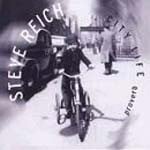Ludwig Wittgenstein (E)
3lyrS.2T
2vib-2kbd (playing 4 five-octave kbd)
This work requires additional technological components and/or amplification.
Abbreviations (PDF)
Boosey & Hawkes (Hendon Music)
The idea for Proverb was originally suggested to me by the singer and conductor Paul Hillier who thought of a primarily vocal piece with six voices and two percussion. What resulted was a piece for three sopranos, two tenors, two vibraphones and two electric organs, with a short text from Ludwig Wittgenstein. Since Paul Hillier is well known as a conductor and singer of early music and since I share an interest in this period of Western music, I looked once again at the works of Perotin (Scholl of Notre Dame – 12th century) for guidance and inspiration.
The three sopranos sing the original melody of the text in canons that gradually augment or get longer. The two tenors sing duets in shorter rhythmic values against held tones from the sopranos. The two electric organs double the singers throughout (except at the very beginning when they sing a Capella) and fill in the harmonics. The piece is in constantly changing meter groupings of twos and threes giving a rhythmically free quality to the voices. After about three minutes of voices and organ only, the vibraphones enter enunciating these interlocking shifting groups of two and three beats.
The original theme in the voices is then inverted and moves from B minor to E-flat minor. In this contrasting section the original descending melodic line becomes a rising one. The last part of the piece is one large augmentation canon for the sopranos returning to the original key of B minor with the tenors singing their melismatic duets continuously as the canon slowly unfolds around them. This is concluded by a short coda which ends, as the piece began, with a single soprano.
Though the sopranos sing syllabically with one note for each word, (and every word of the text is monosyllabic) the tenors sing long melismas on a single syllable. Perotin’s influence may be heard most clearly in these tenor duets against soprano, which clearly resemble three part Organum. That same influence plays a more indirect role in the soprano augmentation canons which are suggested by the augmentation of held tenor notes in Perotin’s Organum.
The short text, "How small a thought it takes to fill a whole life!" comes from a collection of Wittgenstein’s writing entitled Culture and Value. Much of Wittgenstein’s work is ‘proverbial’ in tone and in its brevity. This particular text was written in 1946. In the same paragraph from which it was taken Wittgenstein continues, "If you want to go down deep you do not need to travel far".
—Steve Reich
Reproduction Rights:
This program note may be reproduced free of charge in concert programs with a credit to the composer.

Theatre of Voices / Steve Reich Ensemble / Paul Hillier
Nonesuch 0349709176
Buy the MP3 album from Nonesuch

